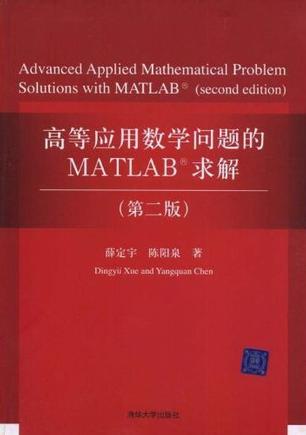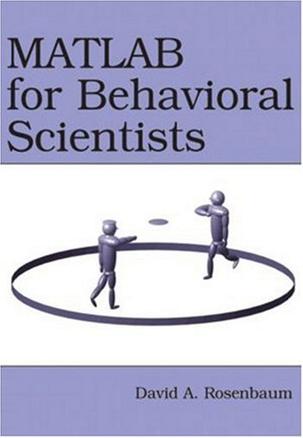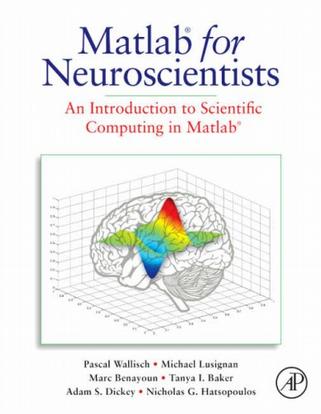欢迎来到相识电子书!
标签:Matlab
-
高等应用数学问题的MATLAB求解
薛定宇和陈阳泉编著的《高等应用数学问题的MATLAB求解》首先介绍了MATLAB语言程序设计的基本内容,在此基础上系统介绍了各个应用数学领域的问题求解,如基于MATLAB的微积分问题、线性代数问题的计算机求解、积分变换和复变函数问题、非线性方程与最优化问题、常微分方程与偏微分方程问题、数据插值与函数逼近问题、概率论与数理统计问题的解析解和数值解法等,还介绍了较新的非传统方法,如模糊逻辑与模糊推理、神经网络、遗传算法、小波分析、粗糙集及分数阶微积分学等领域。 《高等应用数学问题的MATLAB求解》可作为高等学校理工科各专业本科生和研究生学习计算机数学语言的教材和参考书,也可供科技工作者、教师学习和应用MATLAB语言解决实际数学问题时参考,还可作为读者查询某数学问题求解方法的手册。 -
MATLAB for Behavioral Scientists
"MATLAB for Behavioral Scientists" is a tremendously valuable textbook that walks behavioral scientists through the computer programming process, using terms that are relevant to their concerns and appreciating their special programming needs. -
PsychToolBox工具箱及Matlab编程实例
PsychToolbox(PTB)是专门用于心理学实验编制的免费函数库,它提供了对硬件操作的底层接口,能够开发功能复杂,近乎各个自然科学和社会科学研究领域的实验程序,与Matlab能够完美结合。本书是根据作者十几年的编程经验写作而成。全书共分13章,主要介绍了Matlab基础知识、Matlab编程基础、用于实验编程的常用Matlab函数、PsychToolbox函数介绍、PTB与OpenGL的结合、与EyeLink眼动仪及NeuroScan脑电仪的连接等内容。 -
Matlab for Neuroscientists
Matlab is the accepted standard for scientific computing, used globally in virtually all Neuroscience and Cognitive Psychology laboratories. For instance, SPM, the most used software for the analysis and manipulation of fMRI images in research and clinical practice is fully programmed in matlab, and its use of the possibility to allow for sophisticated software modules to be freely added to the software has established it as the by far dominant software in the field. Many universities now offer, or are beginning to offer matlab introductory courses in their neuroscience and psychology programs. Nevertheless, so far there hasn't been a textbook specific to this market, and the use of the plethora of existing engineering focused Matlab textbooks is notoriously difficult for teaching the package in those environments. This is the first comprehensive teaching resource and textbook for the teaching of Matlab in the Neurosciences and in Psychology. Matlab is unique in that it can be used to learn the entire empirical and experimental process, including stimulus generation, experimental control, data collection, data analysis and modeling. Thus a wide variety of computational problems can be addressed in a single programming environment. The idea is to empower advanced undergraduates and beginning graduate students by allowing them to design and implement their own analytical tools. As students advance in their research careers, they will have achieved the fluency required to understand and adapt more specialized tools as opposed to treating them as "black boxes". Virtually all computational approaches in the book are covered by using genuine experimental data that are either collected as part of the lab project or were collected in the labs of the authors, providing the casual student with the look and feel of real data. In some rare cases, published data from classical papers are used to illustrate important concepts, giving students a computational understanding of critically important research. The ability to effectively use computers in research is necessary in an academic environment that is increasingly focused on quantitative issues. Matlab represents an ideal language of scientific computing. It is based on powerful linear algebra structures which lend themselves to empirical problems on the one hand, while at the same time allowing the student to make rapid problem-oriented progress (particularly in terms of visualization of data points) without having to lose focus by worrying too much about memory allocation and other "plumbing" minutiae as would be required in other, more low-level programming languages such as C or C++. Currently, there are several books that provide introductions to Matlab that are either too generic and fundamental or too irrelevant for neuroscientists and cognitive psychologists who typically face a very circumscribed range of problems in data collection, data analysis and signal processing. Some non-book tutorials and primers that are in use in the community are typically out of date. Matlab versions are usually not backwards compatible. Many commands and functions used in older tutorials and primers, such as "flops" won't work in current versions of Matlab, necessitating a book that is timely and up-to-date. The complete lack of a relevant resource in this area, combined with a clearly felt need for such a text provided the primary and initial impetus for this project. The authors provide such a dearly needed resource adapting and pooling materials that developed for and used in highly rated courses involving the use of Matlab in Neuroscience at the University of Chicago. Two co-authors (PW and NH) have presented their respective work on teaching Matlab at national meetings and two of the co-authors (PW and MB) were awarded the coveted University of Chicago's Booth Prize for excellence in teaching these courses. (http://chronicle.uchicago.edu/070524/boothprize.shtml ). * The first comprehensive textbook on Matlab with a focus for its application in Neuroscience * Problem based educational approach with many examples from neuroscience and cognitive psychology using real data * Authors are award winning educators with strong teaching experience * Instructor's Website with figurebank, additional problems and examples, solutions, etc -
MATLAB for Psychologists
The matrix laboratory interactive computing environment--MATLAB--has brought creativity to research in diverse disciplines, particularly in designing and programming experiments. More commonly used in mathematics and the sciences, it also lends itself to a variety of applications across the field of psychology. For the novice looking to use it in experimental psychology research, though, becoming familiar with MATLAB can be a daunting task. MATLAB for Psychologists expertly guides readers through the component steps, skills, and operations of the software, with plentiful graphics and examples to match the reader's comfort level. Using an extended illustration, this concise volume explains the program's usefulness at any point in an experiment, without the limits imposed by other types of software. And the authors demonstrate the responsiveness of MATLAB to the individual's research needs, whether the task is programming experiments, creating sensory stimuli, running simulations, calculating statistics, or biosignal processing. Key features of the coverage: Thinking in a matrix way.Handling and plotting data.Guidelines for improved programming, sound, and imaging.Statistical analysis and signal detection theory indexes. The Graphical User Interface.The Psychophysics Toolbox.MATLAB for Psychologists serves a wide audience of advanced undergraduate and graduate level psychology students, professors, and researchers, as well as lab technicians involved in programming psychology experiments. -
MATLAB教程
《MATLAB教程》以MATLAB R2010a为基础修订,系统讲解MATLAB基本环境和操作要旨;分章阐述符号计算、数值计算、计算结果可视化及编程精要;举例展现MATLAB精华工具Simulink的功能级和元器件级仿真能力;举例剖析MATLAB界面编辑器的用法和图形用户界面(GUI)的制作要求;简要勾画MATLAB和Word集成一体的Notebook环境。 全书包含173个多年凝练的计算范例和83个开拓思路的习题。所有算例程序可靠、完整,读者可以完全准确地重现《MATLAB教程》所提供的算例结果。书配光盘中附有包含彩色图形的电子版习题答案。书后编有索引,《MATLAB教程》所用全部指令及配套的标点符号一览无余。利用索引,读者很容易查阅演示各指令和标点使用方法的节次。 全书由印刷版和电子版结合而成。印刷版便于读者进行系统、全面、长时间连续阅读,便于读者随手翻阅、浏览;而电子版则方便教师制作电子讲稿,方便学生完成电子作业,向读者提供实践《MATLAB教程》内容所需的全部可靠程序、色彩信息和动态交互环境,还将随MATLAB版本升级而及时地向读者提供新内容。 《MATLAB教程》内容充实、篇幅紧凑,是专为理工科院校本科生系统学习MATLAB而撰写的,也可供部分研究生使用;既可用于课堂教学教材及课程设计、毕业设计参考用书,也可作为自学用书。 -
电力电子应用技术的MATLAB仿真
为了满足电力电子专业及其相关领域人员对计算机仿真知识的需求,使其掌握当前先进的计算机仿真工具,特编写本书。本书首先介绍了MATLAB软件及其图形仿真界面Simulink的基础应用知识,详细介绍了用于电力电子仿真的SimPowerSystems中的各模块库,然后列举了DC-DC变换、DC-AC变换、AC-DC变换、直流调速、交流调速等方面的应用。全书通过大量实例介绍了电力电子应用技术的仿真方法和技巧。 本书适用于高等学校电力电子专业及其相关专业的教材,也可供相关专业的工程技术人员学习和参考。 -
面向计算科学与工程的Matlab编程
《世界著名计算机教材精选:面向计算科学与工程的Matlab编程》主要介绍基于计算机、利用MATLAB环境的问题求解过程,它非常适合于计算科学与工程相关专业的学生用来学习至关重要的一些概念与编程技巧。通过“用实例教学”的方法,《世界著名计算机教材精选:面向计算科学与工程的Matlab编程》作者精心选取了若干问题,帮助初学编程者掌握这些必需的概念和技巧。《世界著名计算机教材精选:面向计算科学与工程的Matlab编程》每一节首先给出一个问题的定义,然后介绍求解它所必需的新的MATLAB语言功能。求解问题之后是“讨论点”栏目,通过它介绍计算科学与工程中的一些相关主题。《世界著名计算机教材精选:面向计算科学与工程的Matlab编程》的例题、讨论点以及300多个课后习题,为读者建立起对离散过程、维度意识、误差、可视化、随机性与复杂度等概念的洞察力。这为学习计算科学与工程领域的后续课程打好了基础。
热门标签
下载排行榜
- 1 梦的解析:最佳译本
- 2 李鸿章全传
- 3 淡定的智慧
- 4 心理操控术
- 5 哈佛口才课
- 6 俗世奇人
- 7 日瓦戈医生
- 8 笑死你的逻辑学
- 9 历史老师没教过的历史
- 10 1分钟和陌生人成为朋友








